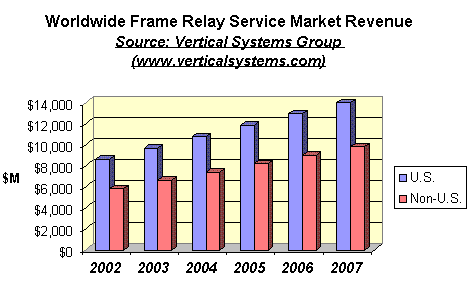Report: Frame Relay Forges On
The market for Frame Relay services isn't going anywhere but up for the near term, says Vertical Systems Group
May 1, 2003

Rumors of Frame Relay's demise have been greatly exaggerated. Indeed, it looks as if Frame Relay services worldwide are set to grow at an annual rate of about 10 percent for the next five years, according to a report from Vertical Systems Group.
The firm says Frame Relay service revenues grew 14.4 percent to a total of $14.5 billion worldwide last year, and will grow about 12.3 percent to $16.2 billion in 2003. While the annual growth rate will decline a bit over the next few years, growth will still be substantial, expecially in the U.S., where the bulk of sales are made. In 2002, for instance, domestic sales were nearly 60 percent of the worldwide total. The telecom downturn may be aiding Frame Relay. As companies add faster ports, and U.S. companies expand outside North America, the service is seen as an easy-to-digest add-on to existing services, delivering bandwidth and protocol flexibility without requiring a commitment to something new. Tight budgets make that a more attractive choice than IP VPNs (virtual private networks), which call for architectural changes on the part of the carrier and its customer (see Crossing Over to VPNs and Readers Take Shots at IP VPNs ).
The telecom downturn may be aiding Frame Relay. As companies add faster ports, and U.S. companies expand outside North America, the service is seen as an easy-to-digest add-on to existing services, delivering bandwidth and protocol flexibility without requiring a commitment to something new. Tight budgets make that a more attractive choice than IP VPNs (virtual private networks), which call for architectural changes on the part of the carrier and its customer (see Crossing Over to VPNs and Readers Take Shots at IP VPNs ).
The U.S. Frame Relay market also is a key opportunity for RBOCs, Vertical Systems says in its report, which is included in its ENS 2003 online research service. As they expand nationwide via FCC Section 271 approvals, the former Bells could take a big chunk of business that now goes to IXCs and others.
How much of a chunk? By Vertical Systems' calculations, the RBOCs could take up to $2 billion of U.S. market over the next three years. Presently, Vertical Systems estimates that market to be worth roughly $9 billion.
Frame Relay's hardiness may surprise some naysayers, who've foretold its extinction for years now -- only to be proven wrong. "Frame Relay's been an interim technology for ten years," quips Erin Dunne, director of research services at Vertical Systems. "It was supposed to be killed by ATM, and that didn't happen; then, by IP VPNs, and that hasn't happened... For the foreseeable future, it fits a market need. The price is right, the speed is right, the learning curve's right."
— Mary Jander, Senior Editor, Light Reading
You May Also Like



.jpg?width=300&auto=webp&quality=80&disable=upscale)






